
Sea of Tranquility
Written by: Emily St. John Mandel
Reviewed by: Rob Leicht
Genre: Science-Fiction
Score: 4.5/5
Those who have read Emily St. John Mandel’s previous novels know that she has a certain style. Like The Glass Hotel, and Station Eleven before it, Sea of Tranquility has an understated quality to it. It is slow to build while still being completely enthralling from first page to last. Sea of Tranquility is a time travel story at its basis, but it is also so much more. It is a story about the nature of reality, living true to yourself, and finding beauty even when your world is ending.

Books You Should be Excited to Read
Written by: Rob Leicht
As a follow up our recent volume of List in Space, which looked at movie and television projects, we are happy to present a list of upcoming books you should be excited to read. If you’re not, well, that’s why we created this list. So read it. And get excited.
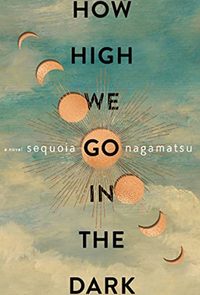
How High We Go in the Dark
Written by: Sequoia Nagamatsu
Reviewed by: Rob Leicht
Genre: Science-Fiction
Score: 4/5
How High We Go in the Dark, the ambitious debut novel from Sequoia Nagamatsu, is a certain product of the COVID pandemic. While still topical and relevant, the pandemic in Nagamatsu’s effort is different enough that neither the minutia nor tragedy of the last two years feels rehashed. And the most familiar aspects of the book are instead the things that transcend individual experience and are a part of universal human nature.

Artemis
Written by: Andy Weir
Reviewed by: Brad Williamson
Genre: YA / Science-Fiction
Score: 2/5
“Artemis” is Andy Weir’s follow-up to his blockbuster debut “The Martian”, but everything that made his first novel so successful is missing from his sophomore effort. “The Martian” had good science, a thrilling concept, original perspectives, and a great protagonist. Admittedly, I enjoyed the movie more than the book, but I liked the novel and respected both its ideas and structure, and I felt Weir had a unique voice throughout the story. Unfortunately he whiffs on all these fronts throughout “Artemis”.

The Causal Angel
Written by: Hannu Rajaniemi
Reviewed by: Brad Williamson
Genre: Science-Fiction
Score: 4/5
The Causal Angel brings together everything from The Quantum Thief and The Fractal Prince, coalescing Rajaniemi’s ideas and writing style into a satisfying finale. It has all the good and none of the bad from its predecessors, pummeling the reader with action, amazing science, beloved characters, and, finally, a great ending. Hannu Rajaniemi concludes his epic trilogy of science, chaos, confusion, technology, and thievery with one final, universe-bending heist.

Dark Age: Red Rising Volume V
Written by: Pierce Brown
Reviewed by: Brad Williamson
Genre: Science-Fiction
Score: 3.5/5
With Dark Age, Brown continues his evolution as a writer; as he did in its predecessor, Iron Gold, Brown focuses heavily on developing characters deeply, more fully exploring what makes them important and worthwhile. This is in stark contrast to the first trilogy, where he introduced a vast array of characters in interesting, though hasty, techniques before dropping the hammer of tragedy repeatedly. Iron Gold and Dark Age feel more meditative, more explorative than the previous volumes.
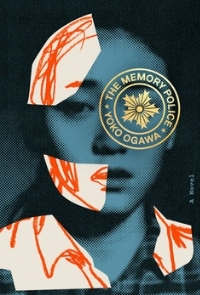
The Memory Police
Written by: Yoko Ogawa
Reviewed by: Joe Bones
Genre: Science-Fiction / Speculative
Score: 4/5
At first, this will all sound familiar. An isolated country, ruled as a police state. Resources are scarce and the country’s inhabitants live simple lives. Luxury items are gradually outlawed and destroyed en masse. Anyone who does not comply is subject to interrogation or arrest by secret police. Paranoia festers as people begin to disappear in the night and hope is diminished by life’s increasing bleakness.

Do Androids Dream of Electric Sheep? [Omnibus]
Written by: Philip K. Dick
Illustrated by: Tony Parker
Colors by: Blond
Letters by: Richard Starkings of Comicraft
Reviewed by: Joe Bones
Genre: Science-Fiction / Comic Book
Score: 4/5
Have you seen Blade Runner? If so, remove thoughts of the movie from your mind; this is a review of the graphic novel adaptation of the book that inspired the movie. It’s an unabridged visual presentation of Philip K. Dick’s seminal Do Androids Dream of Electric Sheep?

The Belgariad: Volume V – Enchanters’ Endgame
Written by: David and Leigh Eddings
Reviewed by: Brad Williamson
Genre: Fantasy
Score: 4.5/5
The concluding chapter of The Belgariad begins with an exciting voyage into the final unexplored region, starting the finale off with a slew of exciting escapes and revelations. We receive an avalanche of fascinating lore in a short span of time with new political intrigue regarding the Mallorean kingdoms, new views into godless tribes, and yet more types of magic that exist throughout the world.

The Belgariad: Volume IV – Castle of Wizardry
Written by: David and Leigh Eddings
Reviewed by: Brad Williamson
Genre: Fantasy
Score: 3.5/5
Magician’s Gambit ends thrillingly, which puts Castle of Wizardry at a disadvantage. Until now, each book has transitioned smoothly and precisely into the next part of the story, but the hand-off here is slightly clumsy. I still loved the novel, and the series remains one of the best fantasy epics ever, but the pace and excitement here just isn’t quite up to par with the rest of the saga.

The Belgariad: Volume III – Magician’s Gambit
Written by: David and Leigh Eddings
Reviewed by: Brad Williamson
Genre: Fantasy
Score: 4/5
With their trademark style, David and Leigh Eddings continue the story right where Queen of Sorcery leaves us, giving the reader a new map, a revealing prologue that grants the tale an added depth without confusing anyone, and that unique sense of joy which other tales scour the universe for and sometimes never find. Then, without wasting any time, the heroes are off to lands until now known only by name to the reader.

The Belgariad: Volume II – Queen of Sorcery
Written by: David and Leigh Eddings
Reviewed by: Brad Williamson
Genre: Fantasy
Score: 4/5
Pawn of Prophecy flows into Queen of Sorcery so fluidly that it’s easy to forget they’re separate books, but this is part of what makes The Belgariad so great; it’s one large story, but also focused and dedicated, much like the protagonists inhabiting its pages.

The Belgariad: Volume I – Pawn of Prophecy
Written by: David and Leigh Eddings
Reviewed by: Brad Williamson
Genre: Fantasy
Score: 4/5
The Belgariad resides directly at the midpoint between classic prophetic fantasy and new-age epic tomes; you’ll find it somewhere between the Lord of the Rings and The Wheel of Time, but it often gets lost in the discussion of all-time best series. In fact, despite consuming science-fiction and fantasy novels for the last 20 years, and knowing about the Belgariad all that time, I’ve only just now gotten around to enjoying it. And I can say for certainty after reading just the first installment: you don’t want to wait as long as I did to read it.

Empire of the Ants
Written by: Bernard Werber
Reviewed by: Brad Williamson
Genre: Science-Fiction / Adventure
Score: 3.5/5
Interweaving two narratives spanning multiple species, “Empire of the Ants” tells the story of a mysterious scientist and the descendants who inherit his knowledge while also detailing the incredible adventure of a small group of ants who risk everything to further their civilization.

The Dutch House
Written by: Ann Patchett
Reviewed by: Brad Williamson
Genre: Family Saga
Score: 3.5/5
With The Dutch House, Ann Patchett invites us into a subtle and unbiased world of hatred and forgiveness, vivid enough to be a true story. The novel reads with a clarity and level of pent-up emotion usually reserved for non-fiction. This rawness is why the book is good, but it’s also what holds it back from being great.

The Influence
Written by: Bentley Little
Reviewed by: Joe Bones
Genre: Horror
Score: 2.5/5
Personally, I consider Bentley Little a modern day H.P. Lovecraft; Little is a master at taking the mundane, and making it terrifying. In The Influence he gives small town life his signature horror treatment.
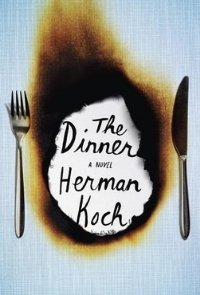
The Dinner
Written by: Herman Koch
Reviewed by: Joe Bones
Genre: Thriller
Score: 4.5/5
Originally written in Dutch, and since translated into over twenty-one languages, this novel masterfully tells the tale of two families, and the secrets that come to light as they sit down to dinner at a fancy restaurant.

Crowded: Volume I – Soft Apocalypse
Written by: Christopher Sebela
Line Art: Rob Stein and Ted Brandt
Colors: Triona Farrell
Reviewed by: Joe Bones
Genre: Science-Fiction / Graphic Novel
Score: 3.5/5
In the world of Crowded, food delivery and driving services are thriving. Society has taken these job share apps to the next level; through the Reaper app, people can put out hits on their enemies, and any user can become an assassin.

The Wicked + The Divine: Volume II
Written by: Kieron Gillen
Illustrated by: Jamie McKelvie
Published by: Image Comics
Reviewed by: Joe Bones
Genre: Comic Book / Fantasy
Score: 5/5
Even when an indie comic’s synopsis intrigues me I’m usually turned off by either the art or the cover price. I tend to stick to DC because I’m familiar with the characters and their histories. Yet every once in awhile, I’ll take a chance on an indie comic. Such was the case for The Wicked + The Divine. This series has totally blown me away.

Solaris
Written by: Stanislaw Lem
Reviewed by: Brad Williamson
Genre: Science-Fiction
Score: 3/5
One of the toughest duties of a critic is to voice dislike for unanimously praised works. I wanted to love this book, and I did like it–parts were quite engrossing–but overall it fell flat. Maybe my expectations were too high, maybe it has aged poorly, maybe I didn’t like the romantic aspect interfering with the science-fiction, but I am disappointed to say that I did not love “Solaris”. Still, it was a good book.

Cat’s Cradle
Written by: Kurt Vonnegut
Reviewed by: Brad Williamson
Genre: Parody
Score: 2/5
I’m not afraid to admit I’ve always strayed away from Vonnegut. Though I’m unsure the precise reason for this, I’d describe it as a personal dislike for the pervasive mood surrounding discussion of his books. But I recently decided to order this and Slaughterhouse.

The Pastel City
Written by: M. John Harrison
Reviewed by: Brad Williamson
Genre: Science-Fiction / Fantasy
Score: 4.5/5
With The Pastel City M. John Harrison created one of the most beautiful blends of fantasy and science-fiction ever envisioned. Brilliantly plotted, with prose full of surprises and surreal imagery, this small novel–almost a novella, mind you–packs more excitement, lore, character-, and world-building into 150 pages than some series fit into entire arcs.

Perfume: The Story of a Murderer
Written by: Patrick Süskind
Reviewed by: Brad Williamson
Genre: Literary
Score: 5/5
Sometimes a novel or a film comes along and unexpectedly blows you away for one reason or another, or ten. Perfume is one such novel. I actually learned about this book from the movie adaptation of the same name and while the film is good and faithful to the story, it’s not nearly amazing as its source material. In Perfume, Patrick Süskind takes us on a journey through time, literary styles, and originality unlike anything before or since.

Uranus
Written by: Ben Bova
Reviewed by: Rob Leicht
Genre: Science-Fiction
Score: 2/5
Ben Bova is a pretty big name in science-fiction, or at least he used to be. Our world has changed a lot since his career began, and our fiction has changed along with it. Many of the old sci-fi tropes don’t resonate as much anymore. And one result is that Bova and his ilk have experienced a decrease in recognition among many readers. Yet kudos to him, he has kept the releases coming at regular intervals into his late 80s. Obviously somebody is reading them. His most recent, Uranus, does not bring anything new to the table and certainly won’t be praised for an epic scope. It’s not terrible, but it is formulaic.
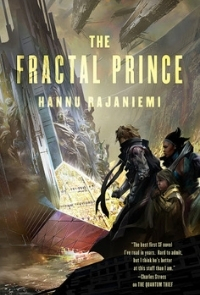
The Fractal Prince
Written by: Hannu Rajaniemi
Reviewed by: Brad Williamson
Genre: Science-Fiction
Score: 3.5/5
As with The Quantum Thief, this is a wild ride through space, time, and imagination. Any complaints with the novel or Rajaniemi’s writing cannot be lain at the feet of a lack of vision or creativity. Sadly, however, despite the undeniably spectacular moments this novel has in store, it also has glaring holes.

Gift Ideas for Bookworms
Written by: Rob Leicht
Generally speaking, avid readers and bookworms are not an easy group of people to shop for. I know this because I am one of them. You hesitate to gift books for fear of giving one that is already in their collection or which they won’t like. Gift cards and cash, while appreciated (can be used to buy books), are impersonal. With that in mind, here is a curated list of exceptional book related gifts that the reader in your life is sure to love.
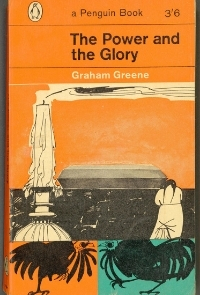
The Power and the Glory
Written by: Graham Greene
Reviewed by: Brad Williamson
Genre: Religious / Literary
Score: 1/5
A big trend propelling science-fiction the last few years has been a reevaluation of previously misrepresented authors and works, going both directions; some have been given their rightful due, while others have been disgraced because of their racist, sexist, or other inhumane themes and language. Graham Greene is the exact opposite of science-fiction, but I think it’s time for a similar review of his most famous work, The Power and the Glory.

The Doors of Eden
Written by: Adrian Tchaikovsky
Reviewed by: Rob Leicht
Genre: Science-Fiction
Score: 4.5/5
As mentioned here, Adrian Tchaikovsky has vaulted up our lists of must read authors. His newest novel, The Doors of Eden, was released in August, and if it wasn’t for Piranesi would be the best book I’ve read this year. Truly epic in scope and wildly imaginative, Tchaikovsky has seamlessly combined his hard science-fiction sensibilities with the pacing of a modern political thriller and the result is remarkable.
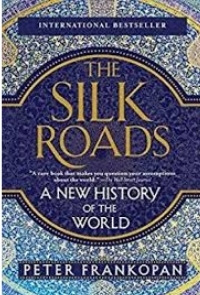
The Silk Roads: A New History of the World
Written by: Peter Frankopan
Reviewed by: Brad Williamson
Genre: Historical Non-fiction
Score: 4/5
What do you think of when you see pictures of the Roman Colosseum? What about the Taj Mahal? When you hear names like Alexander the Great and Genghis Khan, who do you envision? How much do you truly know about these people, monuments, and the defining events of history’s empires? In The Silk Roads, Peter Frankopan condenses more than 5,000 years of history into a 500-page book that is equally educational, interesting, and thought-provoking. Not only does he provide a new way to look at the evolution of human history and society, but he gifts us a framework for analyzing our collective heritage that works for the past, present, and, most importantly, into the future.

Center Field of Gravity’s Most Anticipated Books
Center Field of Gravity’s Most Anticipated Books
Following the publication of our recent List in Space article, which focused on upcoming movies and television shows, we are now turning our attention to the most exciting recent, upcoming, and long-term book prospects. It’s a mixture of mainstream and niche offerings, but each one will almost certainly live up to its lofty expectations. So if you need some winter reading, or if you’re just looking for the next potential great read, look no further than toward these novels:

Wacky Raceland
Written by: Ken Potac
Illustrated by: Leonardo Manco
Reviewed by: Joe Bones
Genre: Comic / Science-Fiction
Score: 0.5/5
Warner Brothers owns DC Comics and the rights to the Hanna-Barbera characters. For the last several years, they’ve given DC license to create crossover comics combining characters from these two properties. From this initiative have come maxi-series, mini-series, and a collection of one-shot specials. Although these comics boil down to nostalgia centered “money grabs” they are a fun deviation from DC’s main line. Some of these crossovers are really good, and some are really bad. Wacky Raceland is just plain awful.

The Haunting of Cabin Green
Written by: April A. Taylor
Reviewed by: Joe Bones
Genre: Horror / Suspense
Score: 3.5/5
The Haunting of Cabin Green is a very surprising novel that offers more than the dust jacket leads one to expect. I always go into anything described as ‘modern Gothic’ fiction with quite a bit of skepticism. Oftentimes, novels and films bearing this description have a few Gothic elements, such as a spooky castle or elements of romance. Yet they devolve into either generic horror or a different horror genre entirely, such as a haunting theme or creature feature. That was not the case for The Haunting of Cabin Green, as it is truly an example of Gothic horror set in our modern world.
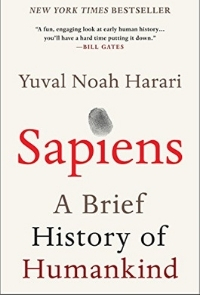
Sapiens: A Brief History of Humankind
Written by: Yuval Noah Harari
Reviewed by: Brad Williamson
Genre: Non-fiction / Theory
Score: 1.5/5
Sometimes global phenomenons are spectacular, but sometimes they’re just average works that stick the right nerve at the right moment in time. With over 16 million copies sold and published in 60 languages, receiving awards from American and Chinese institutions, and everywhere in between, Sapiens is a definitive phenomenon. So is it a transformative treatise on society and culture, or an egotistical rationalization of capitalism and rampant inequality?

Mexican Gothic
Written by: Sylvia Moreno-Garcia
Reviewed by: Joe Bones
Genre: Horror / Historical Fiction
Score: 4.5/5
To quote Jack McBrayer’s character in Forgetting Sarah Marshall, “The way they mix the sexuality and the violence. I love it.” It’s because of this mixture that I love slasher films and am drawn to Gothic horror. An element of romance, usually scandalous, forbidden, or fated to be doomed, is a key component in classic Gothic literature. This is a detail often glossed over in modern interpretations as writers focus on the other two main elements of Gothic fiction, the setting/atmosphere and the supernatural. Admittedly these last two elements are essential for Gothic works, but a true modern Gothic story should, in my opinion, include nods to all three. In Mexican Gothic, author Sylvia Moreno-Garcia unites all three of these elements into a suspenseful horror novel that serves the genre proudly.

Piranesi
Written by: Susanna Clarke
Reviewed by: Rob Leicht
Genre: Fantasy
Score: 5/5
In 2004 British author Susanna Clarke amazed the world with her debut fantasy novel Jonathan Strange & Mr. Norrell. The international bestseller about two rival magicians and the return of English magic was shockingly original. Now, sixteen years later, a new novel appears like magic out of thin air. Piranesi is vastly different from Clarke’s first book but incorporates many of the same themes, and it is no less remarkable of a work of art.

Jennifer Government
Written by: Max Barry
Reviewed by: Rob Leicht
Genre: Dystopia
Score: 3/5
The world of Jennifer Government is one of giant corporations that control everything in a hyper-competitive free market. Hack Nike (employees take the last name of the companies they work for) signs a new contract from the marketing department without reading it and is shocked to find the contract calls for him to murder teenagers as part of Nike’s new advertising strategy. This cascades into a complicated chain of events involving the police, the NRA, violently competitive rewards programs, and one extremely dedicated government agent. While Barry’s satirical take on peak capitalism and the dystopian society it spawns was interesting and original, the story is predictable, ultimately failing to deliver on its initial promises.

The Hidden Girl and Other Stories
Written by: Ken Liu
Reviewed by: Rob Leicht
Genre: Science-Fiction / Fantasy
Score: 4/5
Ken Liu is one of the premier and most prolific short story writers currently active in genre fiction. The Paper Menagerie and Other Stories, his first collection, contains tremendous award winning short fiction. Unlike the stories in that collection, which lean toward fantasy and incorporate themes from Chinese mythology, history, culture, and society, the ones found in The Hidden Girl are predominantly pure science fiction. Artificial intelligence, consciousness, the singularity, and the future of humanity are at the core of the stories in this volume. While the majority of the stories contained within are not as emotionally powerful as those within its predecessor, they are nonetheless purposefully arranged to take the reader on a roller coaster ride. I am at times hopeful for the future of our species and at others terrified.

Invisible Kingdom: Volume I – Walking The Path
Written by: G. Willow Wilson
Art by: Christian Ward
Letters by: Sal Cipriano
Reviewed by: Joe Bones
Genre: Science-Fiction / Comic Book
Score: 3.5/5
This Sci-Fi adventure, from writer G. Willow Wilson, is a multiple 2020 Eisner Award nominee. The story follows two women as they each search for truth. The two most influential entities in a small solar system are Lux, a multi-billion dollar corporation, and a religion called the Reunification…

The God Game
Written by: Danny Tobey
Reviewed by: Joe Bones
Genre: Science-Fiction / Thriller
Score: 4.5/5
The God Game, Danny Tobey’s sophomore novel, is an intense thriller and a compelling character study. Five high school seniors, who call their group of friends the Vindicators, spend their time coding, programming, and playing video games. They stumble upon a mysterious virtual reality computer game. This God Game is supposedly run by an artificial intelligence called G.O.D….

Food Wars: Volume I – The Endless Wilderness
Story by: Yuto Tsukuda
Art by: Shun Saeki
Translated by: Adrienne Beck
Lettering by: NRP Studios
Reviewed by: Joe Bones
Genre: Manga
Score: 3/5
Soma Yukihira wants to become Japan’s greatest chef. After years of apprenticing in his father’s restaurant, he’s sent to the prestigious Totsuki Saryo Culinary Institute. To get in, he must impress Erina Nakiri…

Nova Swing
Written by: M. John Harrison
Reviewed by: Brad Williamson
Genre: Science-Fiction / Noir
Score: 4/5
This is only the second M. John Harrison book I’ve read, yet I’ve already bought every novel he’s written that I can find. His stuff is that good. This particular story is the follow-up to Light. Though set in the same world and filled with references and shared aspects, the two novels are very dissimilar in tone…

Cabin at the End of the World
Written by: Paul Tremblay
Reviewed by: Joe Bones
Genre: Horror / Suspense
Score: 2.5/5
Tremblay’s newest novel departs from his usual subject matter, the supernatural, and enters the realm of the apocalyptic. Similarly to his other novels, this subject is handled in a very cerebral way. The horror in Tremblay’s novels is more psychological than macabre. Cabin at the End of the World is no exception.

Followers
Written by: Megan Angelo
Reviewed by: Joe Bones
Genre: Science-Fiction
Score: 5/5
…In Followers, Megan Angelo describes a future that could become a reality within the next few decades. This novel is a strong debut and one of my favorite books I’ve read this year…

Fatal Folklore Trilogy
Written by: Bill Schweigart
Reviewed by: Joe Bones
Genre: Fantasy / Horror
Series Score: 3.5/5
Sometimes, you just want to turn off your brain and take in a story about monsters. Whether it be a creature feature film or a novel about the things that go bump in the night, tales about monsters are a mainstay of entertainment. In the Fatal Folklore trilogy, Bill Schweigart takes the monster-based horror concept but swaps out the standard monsters for creatures from mythology and folklore.

Eden
Written by: Tim Lebbon
Reviewed by: Rob Leicht
Genre: Science-Fiction/Thriller
Score: 1.5/5
With a setting reminiscent of Jeff Vandermeer’s Southern Reach trilogy, I was excited to read Tim Lebbon’s Eden. The book follows a group of adventure runners as they infiltrate and trek across one of the world’s oldest Virgin Zones. Left mostly untouched for decades, the zone has reverted to a primitive state and has no intentions of letting the group cross unmolested.
![TheQuantumThief[2]](https://www.centerfieldofgravity.com/wp-content/uploads/2020/11/TheQuantumThief2.jpg?x51027)
The Quantum Thief
Written by: Hannu Rajaniemi
Reviewed by: Brad Williamson
Genre: Soft Science-Fiction
Score: 3.5/5
The Quantum Thief by Hannu Rajaniemi is, at the very least, something fresh and new that will keep you entertained. The closest recent analog to Rajaniemi’s style is Yoon-Ha Lee (이윤하), so if you liked Ninefox Gambit and the rest of its trilogy, then you’ll probably fall right into loving Quantum Thief.

Bug! — The Adventures Of Forager
Written by: Lee Allred
Art by: Mike Allred
Colors by: Laura Allred
Reviewed by: Joe Bones
Genre: Comic / Science-Fiction
Score: 0.5/5
Bug! – The Adventures of Forager is a reminiscent romp through Kirby’s DC bibliography. It features characters from the Fourth World, the original Sandman, The Losers, and Atlas the Great.

Teenage Mutant Ninja Turtles / Ghostbusters
Story by: Erik Burnham & Tom Waltz
Art by: Dan Schoening
Colors by: Luis Antonio Delgado
Letters by: Neil Uyetake
Reviewed by: Joe Bones
Genre: Comic Book
Score: 3/5
A comic book featuring a team-up of the Teenage Mutant Ninja Turtles and the Ghostbusters!? The 90’s kid in me just gave a high five to the comic book nerd I’ve become as an adult. This mini-series features a fast-paced story filled with action sequences and comedic moments.

Superman: Up In The Sky – Volumes 4-6
Written by: Tom King
Art by: Andy Kubert
Ink by: Sandra Hope
Color by: Brad Anderson
Letters by: Clayton Cowles
Reviewed by: Joe Bones
Genre: Comic Book
Score: 5/5
In the final three issues of Superman: Up in the Sky, the conclusion to the mini-series originally published in the Wal-Mart exclusive Superman Giant, Superman continues his intergalactic quest to rescue a little girl who has been kidnapped by aliens.

Vurt
Written by: Jeff Noon
Reviewed by: Brad Williamson
Genre: Science-Fiction / Strange-Fiction
Score: 4/5
Vurt is another example in the long line of instances where the Arthur C. Clarke award, despite seeming slightly less well-known than the Hugo, Locus, and Nebula awards, manages to perfectly select the deserving underdog.
![BatmanUniverse[6]](https://www.centerfieldofgravity.com/wp-content/uploads/2020/11/BatmanUniverse6.jpg?x51027)
Batman: Universe – Volumes 4-6
Written by: Brian Michael Bendis
Art by: Nick Derington
Colored by: Dave Stewart
Letters by: Josh Reed & Tom Napolitano
Reviewed by: Joe Bones
Genre: Comic Book
Score: 2.5/5
Issues four through six of Batman: Universe wrap up the story originally published in the Wal-Mart exclusive Batman Giant. This mini-series contains a fun Batman story in between a lot of scenes that feel like filler.

The Wicked + The Divine: Book I
Written by: Kieron Gillen
Illustrated by: Jamie McKelvie
Published by: Image Comics
Reviewed by: Joe Bones
Genre: Comic Book / Fantasy
Score: 4.5/5
The Wicked + The Divine is a series as original as it is timely. It uses a new twist on mythology to reflect on the world we live in. It is an examination of our current society, told in a visual format, through the eyes of classic deities re-imagined into our modern world.

Sideways Volume I: Steppin’ Out
Written by: Dan Didio and Justin Jordan
Art by: Kenneth Rockafort, Robert Gill, and Carmine Di Giandomenico
Colors by: Daniel Brown and John Rauch
Reviewed by: Joe Bones
Genre: Comics / Science-Fiction
Score: 3.5/5
Derek James, the titular Sideways, was caught up in an attack on Gotham City. During the attack, his body was flooded with energy from the Dark Multiverse. He awoke from a coma to find that he had gained the ability to open rifts in the fabric of reality. These rifts allow him to teleport from one place to another.

Teen Titans: Full Throttle
Written by: Adam Glass
Penciler: Bernard Chang
Colorist: Marcelo Maiolo
Letterer: Rob Leigh
Reviewed by: Joe Bones
Genre: Comic Book
Score: 2.5/5
Teen Titans: Full Throttle collects Teen Titans issues 20 through 24 and a special introductory issue. The arc contained in this volume is really fun and takes the Teen Titans in a new direction.

Iron Council: Bas-Lag Volume III
Written by: China Miéville
Reviewed by: Brad Williamson
Genre: Science-Fiction / Fantasy
Score: 4/5
Iron Council is the third part of China Miéville’s wondrous Bas-Lag series, and as with both Perdido Street Station and The Scar, despite sharing the world of Bas-Lag, it is uniquely its own and every bit a Miéville story.

Planetfall
Written by: Emma Newman
Reviewed by: Brad Williamson
Genre: Soft Science-Fiction
Score: 3/5
Planetfall is an interesting book. Despite its name, it is not actually about a group of astronauts making planetfall; it is about what they did years ago during planetfall and how their actions and decisions have sculpted the ensuing society and individuals involved.
This book has a lot going for it, and a lot going against it, but at only 320 pages these highs and lows create a whiplash effect where the reader is both not fully able to enjoy the highs and feels increased frustration toward the lows. Still, taken as a whole, Planetfall is a good novel.

The Calculating Stars
Written by: Mary Robinette Kowal
Reviewed by: Brad Williamson
Genre: Science-Fiction
Score: 2/5
“The Calculating Stars” was a 2018 novel by Mary Robinette Kowal that won almost every major 2019 science-fiction literary award. In it, Kowal re-imagines the space race in a world changed by a meteorite’s destruction of Washington D.C. and the surrounding region.
I enjoyed the book’s perspective regarding how the space race would have gone drastically different if the overall perception of it had been altered. If people had considered space exploration necessary, as opposed to competitive or scientific, where might we be now? Would the moon already be colonized? Would Mars be inhabited?
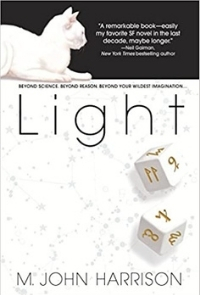
Light
Written by: M. John Harrison
Reviewed by: Brad Williamson
Genre: Science-Fiction
Score: 4.5/5
“Light” is not a normal book. It is not an easy book, either, but it is amazing in many ways. It is also frustrating, but it deals out a good kind of frustration, an extraordinarily rare feeling for a reader. It’s challenging yet short, confusing yet focused, beautiful but hideous, and totally awe-inspiring despite its shortcomings, unsatisfactory plot holes, and unresolved details.

The Shining
Written by: Stephen King
Reviewed by: Brad Williamson
Genre: Horror
Score: 2/5
When you bring up “The Shining”, most people seem to think about the movie first, and rightfully so: it’s a spectacular film. And with all due respect to the novel, without its settings, story line, and characters, the movie never would have been made. Still, I didn’t enjoy the novel; I must say, however, that many of my opinions and views toward it have likely been biased and swayed by my dozens of viewings of its film companion.

The Labyrinth of the Spirits
Written by: Carlos Ruiz Zafón
Reviewed by: Brad Williamson
Genre: Mystery / Suspense
Score: 4/5
Carlos Ruiz Zafón, probably most famous for his novel, The Shadow of the Wind, finishes his Cemetery of Forgotten Books saga with this staggering epic, aptly titled: The Labyrinth of the Spirits.

Titus Groan: Gormenghast Volume I
Written by: Mervyn Peake
Reviewed by: Brad Williamson
Genre: Fiction / Fantasy
Score: 4.5/5
From its opening paragraph to its tumultuous climax to its final scenes Titus Groan delivers on every promise, possibility, and expectation. The characters feel straight out of a Dostoevsky novel, its setting eerie and interesting as anything H.P. Lovecraft ever envisioned, and the plot never stagnates.

Batman: Damned
Written by: Brian Azzarello
Illustrated by: Lee Bermejo
Reviewed by: Joe Bones
Genre: Comic Book / Horror
Score: 3.5/5
In 2018, DC Comics launched a new imprint called Black Label. The comics under this imprint are published in prestige format and are intended for mature readers. Black Label’s goal is to give some of DC’s best writers and artists the opportunity to expand upon the canon of the DC Universe by telling unique, stand alone stories set outside of the current continuity. Batman: Damned was the first original work published under the Black Label imprint.

Superman: Up in the Sky #3
Written by: Tom King
Artist: Andy Kubert
Reviewed by: Joe Bones
Genre: Comic Book
Score: 3.5/5
Before delving into this review for volume III make sure you read our reviews of volumes I and II as well, elsewhere on the website.
Issue #3 contains parts 5 and 6 of the Superman story originally published in the WalMart exclusive Superman: Giant collection. Part 5, “The Thousand Deaths of Lois Lane” was one of my favorite sequences in this story so far. King continues to make Superman a very human character…
![BatmanUniverse[4]](https://www.centerfieldofgravity.com/wp-content/uploads/2020/11/BatmanUniverse4.jpg?x51027)
Batman: Universe #3
Written by: Michael Brian Bendis
Artist: Nick Derington
Colorist: Dave Stewart
Letterer: Josh Reed
Reviewed by: Joe Bones
Genre: Comic Book
Score: 2/5
In case you missed them, make sure to read my previous reviews of this mini-series thus far, elsewhere on the website.
Issue 3 of Batman: Universe started with a bang, and ended with a whimper. The issue starts out with a lot of promise. Picking up where the last issue left off, Batman finds himself on the planet Thanagar.

The Ten Thousand Doors of January
Written by: Alix E. Harrow
Reviewed by: Rob Leicht
Genre: Fantasy
Score: 4.5/5
Even among the mountains of books about portals, doors, and other worlds, The Ten Thousand Doors of January stands as a unique achievement. It is a tale about the stories that exist within stories, the pain of loss, the glory of discovery, and the soul-crushing feeling of not having a place in this world. Alix Harrow has written a novel that is simultaneously haunting and achingly beautiful.

Supernova Era
Written by: Cixin Liu
Reviewed by: Rob Leicht
Genre: Science Fiction
Score: 2.5/5
I am a huge fan of Cixin Liu. The Rememberance of Earth’s Past trilogy is a masterpiece, and I anxiously await any new release from one of China’s science fiction masters. But Supernova Era is unlike any of Cixin’s other stories. This is not a sprawling sci-fi epic with a grand scope and tough ideas. Instead it focuses on the characters and the sociological and political ramifications of a singular event. This novel was actually written years before Rememberance, only now getting an English translation, and it shows. Supernova Era feels raw comparatively and is much less ambitious.

Fall; or, Dodge in Hell
Written by: Neal Stephenson
Reviewed by: Brad Williamson
Genre: Hard Science-Fiction
Score: 1/5
I loved Snow Crash. I loved Anathem. I loved Cryptonomicon, the entire Baroque Cycle, Seveneves, and Reamde. Neal Stephenson is one of my favorite writers and science-fiction is my favorite genre. But I did not love Fall; or, Dodge in Hell. In fact, I disliked it.

Iron Gold: Red Rising Volume IV
Written by: Pierce Brown
Reviewed by: Brad Williamson
Genre: Soft Science-Fiction / Action
Score: 3.5/5
Sometimes labeled as volume four within Pierce Brown’s Red Rising saga, Iron Gold is in many ways the first book of a completely new series. Still, despite being planned as two different trilogies, Red Rising can also be viewed as one massive six-volume epic. However, it’s not simply a new cover theme and fresh characters that separates the trilogies. Whether you look at Red Rising as one big story or two separate tales, one thing is certain: Brown changed a lot going into Iron Gold.

The Scar: Bas-Lag Volume II
Written by: China Miéville
Reviewed by: Brad Williamson
Genre: Science-Fiction / Adventure
Score: 5/5
Writing a great novel is difficult enough already, but you’d think following up a story like Perdido Street Station with something equally original and spectacular would be impossible. You’d be wrong, because Miéville did just this with The Scar.

Perdido Street Station: Bas-Lag Volume I
Written by: China Miéville
Reviewed by: Brad Williamson
Genre: Science-Fiction / Fantasy
Score: 5/5
Never before has hard science been so entertaining; it has been interesting, educational, and thought-provoking, but Miéville changes the paradigm and makes it pure fun. It’s also not real.

Morning Star: Red Rising Volume III
Written by: Pierce Brown
Reviewed by: Brad Williamson
Genre: Soft Science-Fiction / Space Opera
Score: 4.5/5
Few modern books manage to maintain the prolonged tragedy which is the backbone of Brown’s Red Rising series. But it’s not just the shocking, gut-wrenching twists that make these books great. The growth from one book to the next, the impressive prose, the immaculate pacing…

Golden Son: Red Rising Volume II
Written by: Pierce Brown
Reviewed by: Brad Williamson
Genre: Soft Science-Fiction / Action
Score: 4/5
If you’ve read Red Rising, then you have a pretty good idea what you’re getting into; if you haven’t read Red Rising, then stop reading this right now and go read it.
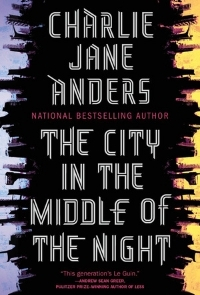
The City in the Middle of the Night
Written by: Charlie Jane Anders
Reviewed by: Brad Williamson
Genre: Science-Fiction / Romance
Score: 1.5/5
Excited as I was to read this book, it never coalesced into something I could enjoy. I appreciated the story and am glad I read it, but it was too frustrating and fleeting to be immersive.
The setting is good: on a tidally locked planet the descendants of a colonizing ship have splintered into two cities within the thin belt of habitable land between the day- and night-sides.

Red Rising: Volume I
Written by: Pierce Brown
Reviewed by: Brad Williamson
Genre: Soft Science-Fiction / Action
Score: 4/5
I didn’t know much about its plot going into Red Rising, but I’d heard a lot of praise for the series and am always looking for new science-fiction, so I went on a limb and bought the first book. Before I get any further into this review, some transparency: I bought the other 4 books of the series before reaching page 200.

Stars in my Pocket like Grains of Sand
Written by: Samuel R. Delany
Reviewed by: Brad Williamson
Genre: Science-Fiction
Score: 4/5
Science-fiction has always been a haven for the weird, strange, and unconventional. Still, few authors have pushed these boundaries far as Delany. Best known for his great book, Dhalgren, Stars in my Pocket like Grains of Sand is something completely different yet equally great.

Superman: Up in the Sky #2
Written by: Tom King
Illustrated by: Andy Kubert
Reviewed by: Joe Bones
Genre: Comics
Score: 4/5
Author Tom King’s strengths as a writer really show through in Superman: Up in the Sky #2. This issues contains Parts Three and Four of the ongoing story, which was originally published in a series of Wal-Mart exclusive collections of individual Superman stories. Issue #2 continues Superman’s search for the kidnapped little girl, but does so in an unexpected style. One would expect to see a linear progression of specific moments in Superman’s search for the girl. Yet King advances the plot in an unexpected way. Not much is revealed about the girl’s whereabouts, and the mystery of her disappearance is subtly deepened. King makes up for the lack of bread crumbs or direct answers by inserting moments of great emotion into the narrative.

The Tangled Lands
Written by: Paolo Bacigalupi and Tobias S. Buckell
Reviewed by: Brad Williamson
Genre: Fantasy
Score: 3.5/5
Tangled Lands is unique in that it’s neither a traditional novel nor a short story collection; instead, it fuses four separate novellas together, joining them by their shared world. Furthermore, it was co-written by two authors, Paolo Bacigalupi and Tobias S. Buckell, making it even more difficult to review. Still, despite its idiosyncrasies, it is a book well worth reading.
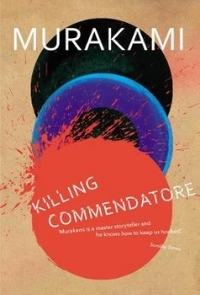
Killing Commendatore
Written by: Murakami Haruki
Reviewed by: Brad Williamson
Genre: Fantasy
Score: 3/5
Murakami Haruki is one of those few authors whose every book is worth reading; I don’t enjoy all his works to the same degree, but I would feel comfortable recommending any and every title as an introduction to him as a writer, as he has a knack for avoiding let-downs. He has novels, non-fiction, short story collections, all while changing genres yet retaining his unique themes and tone of the fantastical within reality. He is an all-time great author destined to be remembered with the likes of Fyodor Dostoevsky, Ursula K. Le Guin, and Gabriel Garcia Marquez, who has penned multiple masterpieces beloved regardless of translation or language. Still, I’m unsure how I feel about Killing Commendatore.
![BatmanUniverse[3]](https://www.centerfieldofgravity.com/wp-content/uploads/2020/11/BatmanUniverse3.jpg?x51027)
Batman: Universe #2
Written by: Michael Brian Bendis
Illustrated by: Nick Derington
Colored by: Dave Stewart
Lettered by: Josh Reed
Reviewed by: Joe Bones
Genre: Comic books
Score: 3.5/5
The second issue of this mini-series greatly improves upon the first issue, delivering a fast paced and humorous story. Batman: Universe #2 contains parts three and four of a story originally printed in the WalMart exclusive Batman Giant.

An Ode to Iain M. Banks
Written by: Brad Williamson
Topic: Critique / Biography / Essay
As a huge fan of science-fiction, Iain M. Banks is one of my favorite writers, but it wasn’t always this way. That is because, for some unidentifiable reason, he doesn’t receive enough credit outside of England and Germany (why this recognition from German panels?) and is less well-known than many of the other so-called greats of the genre, a category in which he most certainly belongs. Sure, people know him, and in certain circles he’s rightfully respected, but I can think of hundreds of books commonly cited ahead of his Culture novels as Books You Should Read. Why is this?

Permanent Record
Written by: Edward Snowden
Reviewed by: Rob Leicht
Genre: Autobiography
Score: 4.5/5
By now we are all familiar with Edward Snowden and the government documents that he turned over to the press in 2013. We have heard his story in many permutations—the government version, the press version, the Hollywood version, etc. But we haven’t heard the story from the man himself, until now. Permanent Record does not contain any bombshells or new revelations, and if that is what you are expecting then you are likely to be disappointed. This book is about more than that. It is how the act came to be, the choices, the ethics, the technology, and, most importantly, the people.

Trample an Empire Down
Written by: Mack Reynolds
Reviewed by: Rob Leicht
Genre: Science-Fiction
Score: 0.5/5
I first discovered Mack Reynolds about six years ago while browsing the sci-fi/fantasy section at a local used bookstore. Reynolds (1917-1983) was a writer of science fiction and was most popular in the 1950s and 60s. Starting in the mid 70s his works began to decline in popularity until Reynolds fell of the map completely. This helps explain why neither I nor any of my science fiction reading comrades had heard of him until that point. After reading the back covers of a few paperbacks, it was soon apparent that Reynolds commonly wrote about alternative socioeconomic systems, futuristic utopias, and revolutions, within a traditional science fiction framework that included alien encounters, intergalactic adventures, and time travel. From the start I was intrigued as all of these themes resonate with me, my reading preferences, and my political ideology.

Joe’s Bone to Pick: The Killing Joke
Written by: Joe Bones
Topic: Comics
Alan Moore’s The Killing Joke has been the center of many different discussions since it was published in 1988. It is often considered the definitive Batman vs. Joker story. There are those who argue that it’s Moore’s best work, some even say it surpasses The Watchmen. Whole Reddit threads have been devoted to the final panels of this graphic novel. There are fans who support Moore’s treatment of the Joker’s origin and those who think revealing any origin for the Clown Prince of Crime is a travesty. However, none of those topics are what I want to discuss today. I’ve got a take on this classic graphic novel that I personally have never seen enter into the discussions of this work. I believe The Killing Joke is the definitive Commissioner Gordon story.

Red Moon
Written by: Kim Stanley Robinson
Reviewed by: Brad Williamson
Genre: Science-Fiction
Score: 3.5/5
Kim Stanley Robinson’s newest book is about colonizing the moon. That should be enough information for everyone to want to go read it, but if it’s not, here’s my review:
If there’s one thing Mr. Robinson does with each new book at this point in his career, it’s ensuring that he writes a fresh story while staying true to his values. His themes and motifs have remained remarkably consistent ever since way back to the Three Californias trilogy, but he still finds slightly new plots and protagonists to put spins on his tales. Red Moon is no different.

Exhalation
Written by: Ted Chiang
Reviewed by: Brad Williamson
Genre: Science-Fiction
Score: 4.5/5
Other than, perhaps, J.D. Salinger and Susanna Clarke, no author has made such literary waves with such meager output as Mr. Chiang. Every sentence, every word, the titles themselves, even the cover art, all these add significance to his work. Nothing about a Ted Chiang collection is superfluous, yet they remain as varied and colorful as any epic.

The Hydrogen Sonata, Culture Volume IX
Written by: Iain M. Banks
Reviewed by: Brad Williamson
Genre: Science-Fiction
Score: 3.5/5
How would the human race be different if one of the major holy books had begun predicting the future instead of retelling the past? If one of them contained instructions for making technology or the locations of sentient life that we subsequently discovered, how would the popular opinion of said holy book change among scientists and other academics? In other words, would such a reality bond science and religion together? And what would the ramifications of this be?

Surface Detail, Culture Volume VIII
Written by: Iain M. Banks
Reviewed by: Brad Williamson
Genre: Science-Fiction
Score: 4.5/5
This may not be Banks’s best work or his most entertaining, or even most thoughtful, but this is where his writing style and playfulness shines the most, and it may be my favorite of all his novels. He found a balance in this book that he began searching for in Use of Weapons and utilized in every subsequent offering, but only perfected it here. I will keep this focused on Surface Detail, but I would like to take a moment to honor Banks’s memory and consider what greatness he might have written with additional years.
While many fans and critics laud Use of Weapons, I think it is one of Banks’s most flawed works; not to say it was bad (see my review elsewhere on the site) but there was a lot he tried to do and failed, and the book felt confused instead of complex. However, Surface Detail represents the work of his closest to a successful Use of Weapons.
![BatmanUniverse[5]](https://www.centerfieldofgravity.com/wp-content/uploads/2020/11/BatmanUniverse5.jpg?x51027)
Batman: Universe #1
Written by: Brian Michael Bendis
Illustrated by: Nick Derington
Reviewed by: Joe Bones
Genre: Comic Books, Superhero
Score: 1/5
This may be a bit blasphemous, but I have found Brian Michael Bendis to be a bit overrated. I just haven’t been enjoying a lot of the work Bendis has been doing since starting at DC Comics. Don’t get me wrong, I respect the guy as a writer. Jessica Jones is an amazing character, and Miles Morales is an awesome take on Spiderman. The descriptions of his creator owned titles, though they haven’t interested me enough to pick them up yet, sound thoughtful and engaging. However, everything I’ve read so far that he has written for DC just hasn’t grabbed me. I find his stories in Superman/Action Comics to be a bit boring. I made it through the first three issues of Young Justice before giving up and removing it from my pull list. Despite that, because of my love for Batman, I decided to pick up Batman: Universe. After reading the first issue, I was very disappointed.

Longitude: The True Story of a Lone Genius Who Solved the Greatest Scientific Problem of His Time
Written by: Dava Sobel
Reviewed by: Rob Leicht
Genre: History, Biography
Score: 4/5
In the modern age, where we can pinpoint our precise location via a smartphone, very few people think in terms of longitude and latitude, the lines that crisscross our globe and form the geographic coordinate system. I, for one, haven’t given the idea much thought since elementary school geography class. Yet, just a few hundred years ago, a solution to the problem of accurately finding longitude, especially at sea, was one worth millions of dollars and could save an untold number of lives. Dava Sobel tells of this centuries long quest for longitude, and it is filled with fascinating tales of shipwrecks, political intrigue, intellectual theft, and wild inventions. Sobel’s account is educational and easy to sink into. But it is also short, coming in at under 200 pages, and some readers may be turned off by this. Longitude is well-researched, but an in depth scholarly work it is not.

Matter, Culture Volume VII
Written by: Iain M. Banks
Reviewed by: Brad Williamson
Genre: Science-Fiction / Adventure
Score: 4.5/5
Matter at first seems one of the largest and most complex of the Culture novels, but it’s actually one of the simplest in structure. Harkening back to Inversions (and, to a lesser extent, even Dune), Banks explores for most of the book, an upstart society not yet on par with the Culture.

Look to Windward, Culture Volume VI
Written by: Iain M. Banks
Reviewed by: Brad Williamson
Genre: Soft Science-Fiction
Score: 4/5
One of the simplest of the Culture novels and also a semi-sequel to Consider Phlebas, which you can also see reviewed elsewhere on our site, Look to Windward is one of the more purely entertaining books of the series.

Superman: Up in the Sky #1
Written by: Tom King
Art by: Andy Kuber and Sandra Hope
Reviewed by: Joe Bones
Genre: Comic Book/Superhero
Score: 3.5/5
Superman: Up In The Sky is a very interesting comic book in and of itself. It was originally published in a collection of Wal-Mart exclusive books called Superman Giant. These exclusive books were each a one-hundred page volume featuring part of a new Superman story and a collection of stories from the Man of Steel’s long history. In July, DC began printing the original story as a six part mini-series.
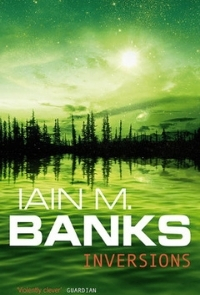
Inversions, Culture Volume V
Written by: Iain M. Banks
Reviewed by: Brad Williamson
Genre: Science-Fiction / Pastoral
Score: 4/5
Unique among the series in that it deals entirely with a planet-bound race, and also in how few characters there are, Inversions in many ways is the simplest of all the Culture novels; that said, it has a complex spirit with deep, introspective themes and multifaceted personalities.

Excession, Culture Volume IV
Written by: Iain M. Banks
Reviewed by: Brad Williamson
Genre: Soft Science-Fiction / Mystery
Score: 4/5
Yet another foray into experimentation, Excession is a mindtrip of perspective. Much of the novel, though not all, is dialogue amongst a group of sophisticated ship AIs, known as Minds. The reader is forced to consider things from outside a human’s experience because the ships’ logic, motivations, abilities, and desires propel the story forward, while it is understood within the context of the universe that the ships have humanity’s best interests in mind. So while the decisions and trains of logic at many times make no sense, one is compelled to consider everything from a fresh point of view from which maybe they do make sense. And this is all done fluidly and naturally, as the reader comes to know the AIs as true individuals, a deep look into the individuality of true sentience outside humanity that few books have accomplished before or since.

Heart-Shaped Box
Written by: Joe Hill
Reviewed by: Joe Bones
Genre: Horror
Score: 3/5
I recently became aware of Joe Hill after AMC announced they are making a television show out of one of his other novels, NOS4A2. Having never read anything by this author, I decided to check him out. I listened to the audio book of NOS4A2, and although I enjoyed it, I wasn’t really that impressed. However, I did like his style of prose so I decided to give one of his other works a try. That’s when I stumbled across Heart-Shaped Box, which happens to the first full novel Hill ever wrote.

Use of Weapons, Culture Volume III
Written by: Iain M. Banks
Reviewed by: Brad Williamson
Genre: Soft Science-Fiction / Mystery
Score: 3.5/5
In an oeuvre full of complex and at times difficult plots and structures, this is the most jarring and dizzying, which, in an exceedingly rare occurrence, Banks fails to completely pull off.
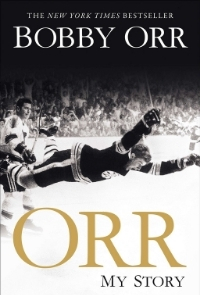
Orr: My Story
Written By: Bobby Orr
Reviewed by: Rob Leicht
Genre: Sports, Autobiography
Score: 3/5
Bobby Orr is widely considered one of the greatest hockey players of all time. For a decade long stretch in the 60s and 70s Orr dominated the game. There were things he could do on the ice that no player had done before or has been able to do since. His career ended well before my time, but I’ve always enjoyed watching Bobby Orr highlights and have great respect for what he achieved. As great as a hockey player that Orr was, he is an even better human being. His modesty and aversion to criticizing others helps to make him an exemplary person, but it does not always make for an exciting autobiography.

Rob’s Most Anticipated Books of Fall 2019
By: Rob Leicht
Topic: Books, New Releases
The last four months of 2019 are filled with new releases to be excited about. From fantasy favorites and science fiction masters to the apocalyptic and strange, there is something for every reader. Without further ado, here are my most anticipated books for the rest of 2019.

The Redemption of Time
Written by: Baoshu
Translated by: Ken Liu
Reviewed by: Rob Leicht
Genre: Science Fiction
Score: 3/5
Liu Cixin’s The Remembrance of Earth’s Past trilogy was completed with the release of Death’s End in 2016 and instantly became must read science fiction for the modern age. In the preface to this novel, Baoshu explains that he was a huge fan of Cixin’s work and was left bereft when the trilogy concluded. Like many others, Baoshu continued the series through fan fiction. When he posted his fan fiction, then called Three Body X, online for public consumption, it went viral. Baoshu wasn’t the only one desperate to spend more time in Liu Cixin’s invented universe. Eventually the book was published with Cixin’s approval under the name The Redemption of Time, and here we are.

Cave Carson Has a Cybernetic Eye: Volume 1
Written by: Gerard Way & Jon Rivera
Illustrated by: Michael Avon Oeming
Reviewed by: Joe Bones
Genre: Comic
Score: 3.5/5
In 2016, DC Comics launched a new “pop-up” imprint called Young Animal. It was curated by Gerard Way of the band My Chemical Romance. He is also the author of Umbrella Academy for those of you who enjoyed the Netflix series based on those comic books. Young Animal’s focus was to explore characters from the DC Universe through an experimental approach. This line was targeted for mature readers and overseen by Vertigo group editor Jamie S. Rich. Young Animal launched with four titles, one of which was Cave Carson Has a Cybernetic Eye.

Consider Phlebas, Culture Volume I
Written By: Iain M. Banks
Reviewed by: Brad Williamson
Genre: Soft Science-Fiction / Space Opera
Score: 4/5
Introducing one of the most clearly realized science-fiction universes in the pantheon of the genre with an all-time great scene, Consider Phlebas opens with a jaw-dropping and mesmerizing first chapter.
Quickly thereafter—immediately, in fact—in typical Banks fashion, the reader is slingshotted from place and perspective and hauled to a completely new and unknown situation in a way that would be utterly jarring if attempted by almost any other writer; Banks, however, forces one to hold and juggle the current scene along with everything written before because every moment is too full of potential and mystery to turn away from

Heroes In Crisis
Written by: Tom King
lllustrated by: Clay Mann
Reviewed by: Joe Bones
Genre: Comic
Score: 4/5
Trade Paperback releases on October 1st, 2019
I’ve got to start out by saying that Heroes in Crisis isn’t for everyone. It is at its core a character study that examines PTSD through the lens of superheroes. People like to poke fun at comic books because the deaths are often meaningless. A deceased character will be back as soon as the next reboot or continuity-shifting crisis/event. What most people don’t think about, and what most comic book writers often only explore for a few filler issues before moving on to the next big event, is the effect the deaths of the characters within a comic book series would have on the other characters in that title.

Player of Games, Culture Volume II
Written By: Iain M. Banks
Reviewed by: Brad Williamson
Genre: Soft Science-Fiction / Space Opera
Score: 4/5
In this volume, Banks makes his premise abundantly clear: each Culture novel will expand the universe while remaining independent of the previous titles. This, while not an original tactic by any means, is something Banks pulls off possibly better than anyone else. Player of Games is probably the most focused and easily read of all the Culture novels, and also one of the shortest, but so too is it one of the very best, most enjoyable, and absolutely rewarding

Station Eleven
Written By: Emily St. John Mandel
Reviewed by: Brad Williamson
Genre: Post-Apocalyptic / Suspense
Score: 4/5
With an opening scene that leaves one wondering how the book is post-apocalyptic, as advertised, yet still marveling at Mandel’s simple yet elegant prose and willing to read on anyway, she certainly hooks you.
You immediately fall in love with Jeevan and the setting rapidly evolves, but then we leave him and leap ahead. And while these abrupt jumps through time, place, and perspective become all too common through the book, the reader is never left feeling confused or disappointed.

The Harrowing
Written by: Alexandra Sokoloff
Reviewed by: Joe Bones
Genre: Horror
Score: 3/5
Really enjoyed this book. This horror novel is like ‘The Breakfast Club” meets “The Haunting.” It takes the best elements of those two stories and mixes them into a great piece of horror fiction. The narrative has great pacing that simultaneously keeps you riveted while never going so fast that the end loses the same flow as the beginning. I personally had trouble relating to the characters but that didn’t limit my enjoyment. Sometimes with this kind of book it’s fun to root for the supernatural element to win.

An Unkindness of Ghosts
Written by: Rivers Solomon
Reviewed by: Joe Bones
Genre: Science-Fiction
Score: 3.5/5
Full disclosure: I went into An Unkindness of Ghosts with some trepidation. I chose to read this book as part of the 2019 Read Harder Challenge. It fit two different tasks, ‘a book by a Trans or non-binary author’ and ‘a book about or set in space by an Author of Color.’ I was pleasantly surprised by how much I enjoyed this sci-fi character study.
This novel’s premise is quite sophisticated. The story takes place on a spaceship traveling to a new world. The spaceship is fleeing a decimated planet and its crew and passengers have been traveling through space for generations. The population of the ship is divided into a caste system based on the share-cropper system of the Antebellum South.